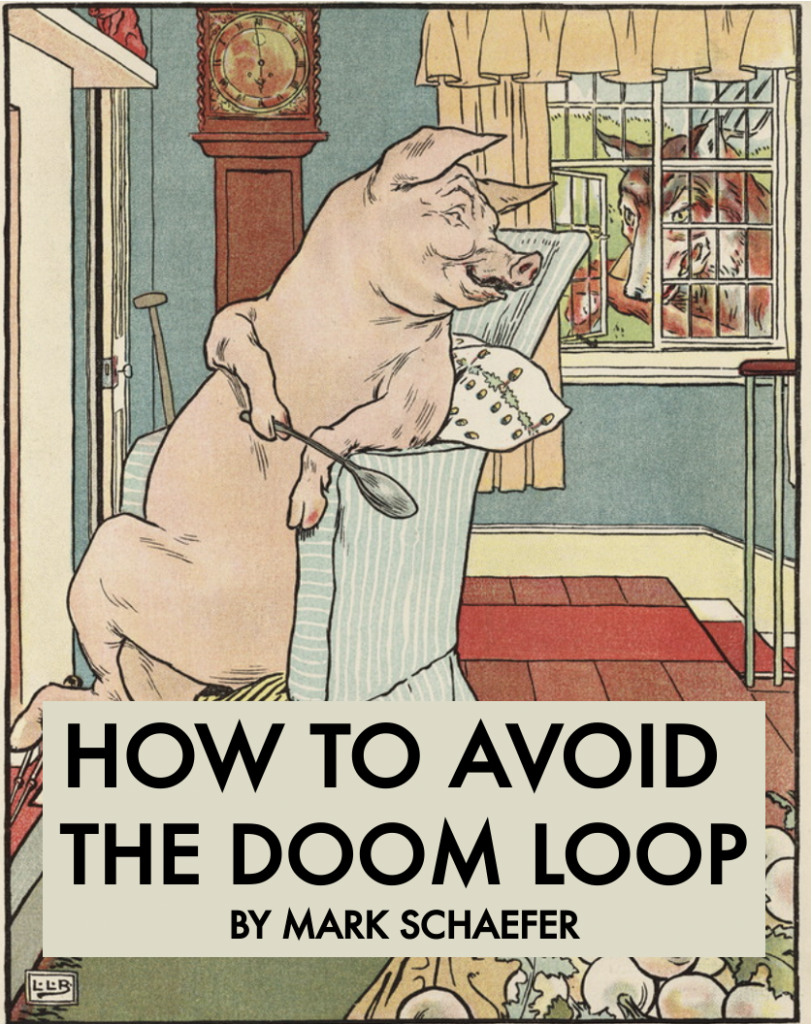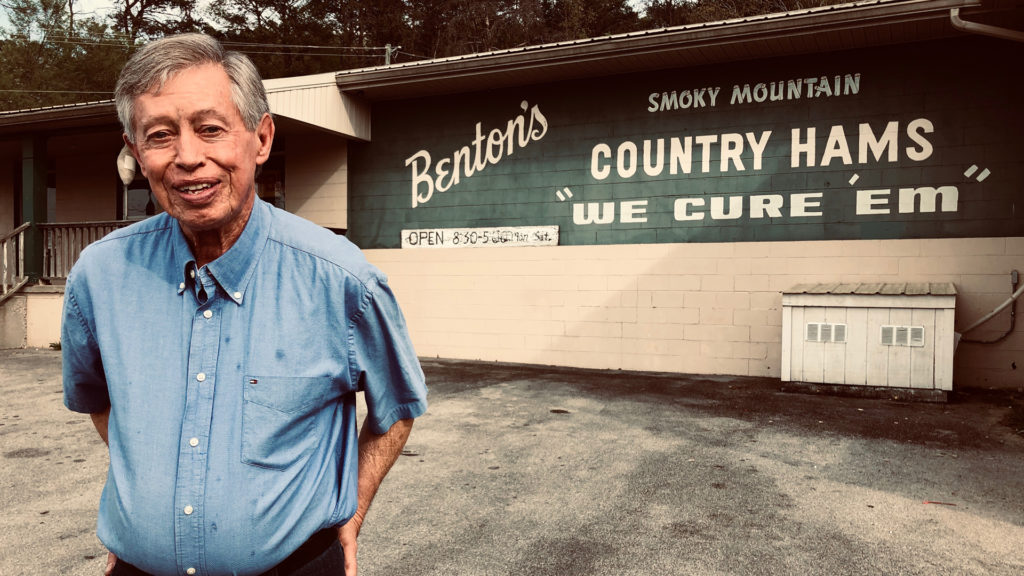
Today I will teach an important business lesson about constancy of purpose and avoiding what Good to Great author Jim Collins calls the “doom loop” that precedes a failing business.
This is an incredibly important consideration if you’re feeling panicked by the pandemic and financial crisis. But it also gives me a chance to write about one of my all-time favorite products, the best bacon in the world.
Let the sizzle begin.
Basics of the best bacon
Allan Benton operates an unassuming storefront called Benton’s Country Hams in Madisonville, Tennessee, just a short drive from my home. But around here, we just call it Benton’s Bacon. The store is more than a little dumpy … it probably hasn’t been updated since 1980. Allan still answers a rotary dial telephone to talk to customers from his crowded office.
But what happens in the smoky rooms just behind the modest store is magic.
Allan Benton makes the best bacon in the world.
American bacon is a commodity. Americans eat so much bacon (an average of 18 pounds a year!) that the processing has been thoroughly automated and industrialized on a massive scale.
But not in this beat-up little store in the middle of nowhere. Every pound of Benton’s bacon is cured by hand over a period of about a month. And the world has noticed. Improbably, the product can be found in some of the most acclaimed restaurants in the world.
Here’s how Allan found his bacon mojo, in his own words.
The Bacon King

Allan Benton
“I was born in Scott County, Virginia, so far back in the hills that you had to look straight up to see daylight. We couldn’t go to the grocery store and buy meats of any kind. Basically, we raised everything we ate, and we had to preserve this meat so it would be available without refrigeration all year long.
“We lived on that pork and counted so much on this to sustain us. I started curing meats as a business with this same process used in my family for generations. It probably came from Europe originally.
“My original family recipe was two parts salt, one part brown sugar, and a handful of red and black pepper. You rub it on a slab by hand. This mixture starts a drying process that takes the moisture out of the ham, removing the environment for bacteria to survive so that it will keep without refrigeration.
“Then we would smoke the meat with hickory and there was something about how we smoked it that people loved. People would come from miles around trying to buy our hams.”
Benton’s bacon is not for the faint of heart. After being cured in salt and brown sugar for 10 days, it’s aged for another 10 before spending three days in a hickory-smoke-filled room. What emerges is intensely smoky bacon with a perfume that will make your house smell like an Appalachian campfire.
So it takes about a month for Mr. Benton to prepare his bacon for sale. Big packing houses can push their product out the door in 24 hours. “We process about 40,000 bacon bellies per year … the bigger packers will do that much in a day,” he said. “One day for them equals our yearly production!”
Avoiding the doom loop
Now, here comes the best lesson from Mr. Benton:
“I had been in business for five years and I told my dad, “I’m not going to make it. I’m going to have to quick-cure our meats because I simply can’t compete with these big competitors. They’re selling them fully-processed for the same prices that I’m BUYING the meat!
“And my dad told me, “Son, if you play the other fella’s game, you will always lose. Stick with your focus on quality. Quality will always win in the end.”
Allan’s business advantage was a decidedly low-tech process of hand-rubbing, hand-curing, and hand-smoking meat in a way that made it different. Through a common-sense business analysis, he saw that his business was vulnerable but he almost lost sight of his only real point of differentiation. Gratefully, he listened to his father.
Eventually, his superior product attracted the attention of chef John Fleer from the exclusive and world-famous Blackberry Farm resort near Knoxville, Tennessee.
The James Beard Award-winning chef was beginning to popularize his version of upscale Appalachian cuisine, and Benton’s hams and bacon were a key component in many dishes. As other notable chefs came to visit Fleer’s kitchen, he introduced them to these remarkable ingredients, and soon Benton’s brand was appearing in some of the top restaurants in the world.
The doom loop and the pandemic
Mr. Benton almost blew it. Without his father’s advice, he might have reacted to a crisis by trudging down a path of automation that would have made him the same as everybody else. He would have ruined his business.
Jim Collins calls this the “doom loop.” When a company faces a crisis, it reacts without discipline, grasping at any fad or new direction, only to experience more disappointment.
This is a very real problem in a world gripped by crisis today. I do a lot of personal coaching and so many people are ready to abandon a proven strategy for short-term gains.
I’m not saying you shouldn’t adjust and react to the situation. Absolutely you should and I wrote about this imperative in my free Pandemic Business Playbook.
Staying the course
A recent article in the Harvard Business Review provided these guidelines for avoiding the doom loop and staying the course.
1. Slow down.
When their markets start to melt down, rather than slamming on the brakes, downshift in order to listen to customers, track the market, conserve resources, and enhance their ability to change direction if needed.
There is an analog in the animal world: The cheetah, the world’s fastest land animal, pursues its prey at just half speed, rarely reaching even close to its 70 miles per hour limit. Scientists believe that this strategy allows the cheetah to save its strength and preserve optionality by not over-committing to the wrong direction as its prey suddenly shifts.
2. Take time to reaffirm your basic thesis.
Slowing down also allows these businesses to make sure their view of the future marketplace was still valid.
For example, Amiad Soto, co-founding CEO of travel company Guesty, engaged his board and executive team to look a few months out; he concluded that Guesty’s fundamentals had not changed: “During the pandemic, people still seek vacation rentals, even though the specific patterns might change: In addition to cleanliness and safety being paramount, we concluded that vacation and short term rentals would become longer and demand would increase. We are in the business of helping/ensuring property management companies thrive, and that did not change for us,” reflected Soto.
3. Trim fat, not muscle.
Part of slowing down is trimming operations, but only around the margins. This is counter to the now-conventional wisdom of crisis-driven cutting into the muscle by reducing payroll faster and deeper than you think is necessary. Yes, take advantage of the fall in prices to renegotiate rental leases and supplier contracts, but consider making only marginal cuts in payroll expenses, primarily through performance management rather than layoffs or furloughs.
4. Watch new data like a hawk.
At the beginning of the pandemic, Home Depot immediately began to trim staff and slash inventory, preparing for a slowdown. But just the opposite happened. The lockdown was an opportunity for people to fix up their houses and the do-it-yourself business boomed. Their competitor Lowes was slower to react and benefitted more from the trend as Home Depot had supply shortages. Watch the data before making dramatic moves.
5. Test for weaknesses and prepare internally.
Companies should apply increased scrutiny not only to the marketplace, but also to their own internal points of failure. You can stay the course only if you stay ahead of the organizational disruption that external shocks can cause. One company “practiced” working from home and found that most employees weren’t prepared. By outfitting home offices early, the company made a smooth transition in the crisis.
Fighting to the other side means being patient and never losing sight of what makes you special to your customers. Sometimes a pivot is required but make sure you’re not entering the doom loop.
. Mark Schaefer is the executive director of Schaefer Marketing Solutions. He is the author of several best-selling digital marketing books and is an acclaimed keynote speaker, college educator, and business consultant. The Marketing Companion podcast is among the top business podcasts in the world. Contact Mark to have him speak to your company event or conference soon.
Mark Schaefer is the executive director of Schaefer Marketing Solutions. He is the author of several best-selling digital marketing books and is an acclaimed keynote speaker, college educator, and business consultant. The Marketing Companion podcast is among the top business podcasts in the world. Contact Mark to have him speak to your company event or conference soon.
Image marked safe for reuse by Picryl


